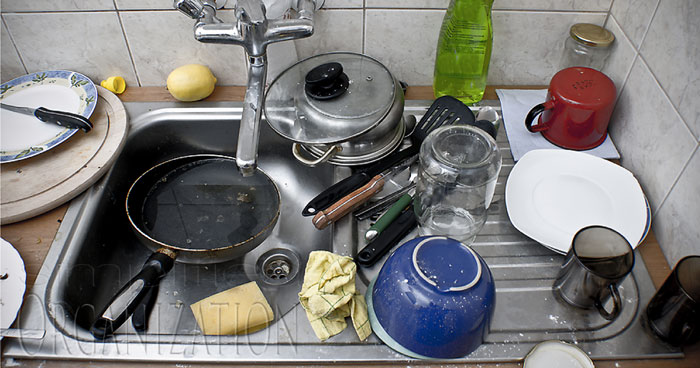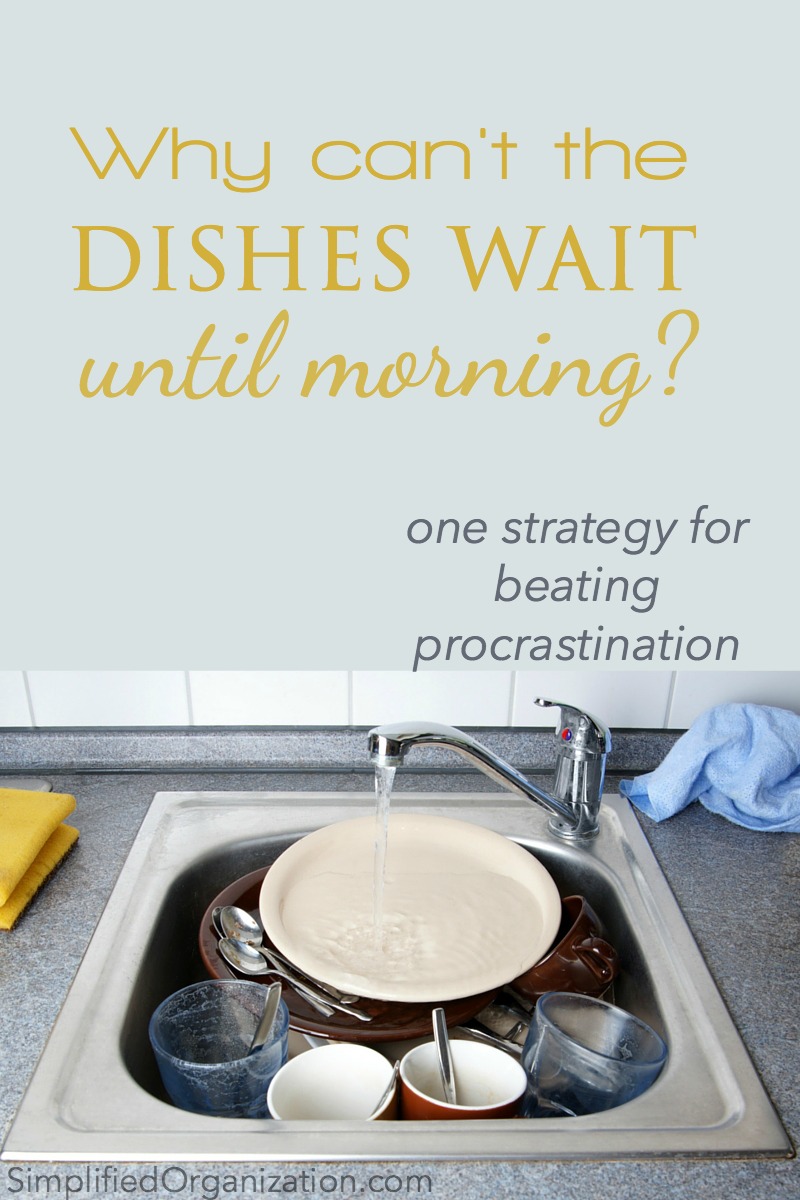Baked chicken. Glazed carrots. Roasted potatoes.

I had put dinner on the table.
Wasn’t that enough for one day?
To get up and then face the collection of plates, cups, pans, utensils, pots – not to mention the counters themselves.
Ugh.
Soaking seemed to be the best solution.
If the dishes wait, no harm is done.
Really, I was being a better housekeeper for putting it all off until the morning.
It would take me so much less time, I told myself, to wait until the morning. The dishes would have soaked. I would have coffee. I could knock it out in no time – in the morning.
For now, I’ll just go read and forget about this room. I’ve always been good at justifying my procrastination.
And so for quite some time I always spent the first part of my day cleaning up from the day before. I refused to feel bad about it. I had made it my deliberate choice and strategy. It wasn’t the worst choice I’ve made in my life, but it didn’t help me, despite my protestations that it did.
The idea that helped me break out of this procrastination rut was “clearing to neutral.”

What’s the point?
I used to think like this:
- “What is the point of making my bed? I’ll only sleep in it again.”
- “What is the point of cleaning the island? I’ll only cook on it again.”
- “What is the point of washing the dishes? We’ll only use them again.”
The dishes can wait because we don’t need them again this instant. Why do them now?
But the change started with the dishes. Then I realized it applied to the island. Finally, I even started making my bed due to the same reasoning.
We wash the dishes because we’ll use them again.
I need to clean the island so that it’s ready to cook on again.
Actually, the reason I need to make my bed is so that we can sleep in it again, welcomed to our rest like decent and orderly people rather than collapsing in a mess like slobs.
The story we tell ourselves matters.
Clearing to neutral is a concept to save us both from perfectionism on the one hand and sloppiness on the other.
Perfectionism thinks the point of a kitchen is to be a pristine showpiece. If it is anything other than perfect, it is not acceptable. This can make us either strive ceaselessly to make our kitchen look like no one lives in the house or, on the other hand, give up all attempts to make it look nice because we will never reach our too-high expectations.
Sloppiness thinks the point of a kitchen is merely to hold things and to perform certain tasks in. Its state does not matter.
Elisabeth Elliot once wrote:
The way you keep your house, the way you organize your time, the care you take in your personal appearance, the things you spend your money on, all speak loudly about what you believe. The beauty of Thy peace shines forth in an ordered life. A disordered life speaks loudly of disorder in the soul.
Our homes are tools to be used for the building up of people. Tools must be cared for, or they aren’t going to last long or be as effective. But the point is never to have a perfectly organized wall of tools that are never used. The use is the important part, but caring for them is essential to their being able to be used.
Clear to neutral
To clear to neutral is to prepare for its next use. After making dinner, we tidy up the kitchen, wash the dishes, sweep the floor, so that the kitchen is ready to prepare the next meal. After wearing clothes, we wash them, dry them, fold them, and put them away so that they’re ready to be worn again, so that we can open our closet in the morning and have something clean and appropriate to wear.
When we do our household duties with an eye toward clearing to neutral, we are keeping the main thing the main thing: our resources are ready to be called into service.
Can’t the dishes wait?
Slowly, but steadily, I started doing the dishes after dinner.
I gave a child the job of unloading the dishes in the morning, which meant I had to get it loaded and run the night before.
Slowly, doing the dishes after dinner spread to sweeping after dinner, to wiping down counters after dinner, to ending the day with a ready-to-go kitchen.
And suddenly in the morning it was pleasant to walk into the kitchen. I didn’t wake up to face my procrastination, wake up to deal with yesterday’s fallout.
I woke up to a fresh start, to a room ready for service.
Maybe you don’t feel like cleaning up in the evening – I certainly don’t – but if you buckle down and do it, will you regret it the next morning? Of course not. You’ll thank yourself. And that is how to perpetuate the change: Do thank yourself, taking the time to notice how nice it is to walk into an orderly room.
It is of value, so don’t gloss over what you have done and count it as worth little.
The dishes can wait, and there is a time for soaking overnight at times, but a pattern of clearing to neutral every evening will make a difference in how you begin your day.

I have been working on this, as well. And I’ve found that doing the dinner dishes is much less overwhelming if I have taken time to do the breakfast and lunch dishes right after those meals. If I ignore them ALL until evening…whew! Then I REALLY don’t want to do them at night.
I really struggle in this area, especially dishes. I love your “clear to neutral” expression – I’m sure that will help motivate me for the next time. I need more “neutral” in my life!
What Elisabeth Eliot book is that from?
Let Me Be a Woman. :)
Thanks for all of your encouraging posts. Sometimes I wonder why I read different bloggers’ posts about doing dishes and sweeping floors over and over as though I don’t know about such things. I ask myself often, “Shouldn’t I be able to hear it or read it once and do it right thereafter?” I suppose that I’m not alone with many other women who weren’t taught how to keep a house as a child. If I have to explain and encourage my kids over and over to fold their laundry and pick up their toys so that they develop good habits, then I guess what I’m doing when I read encouragement and instruction like yours over and over is making up for what was missing in my own childhood. Thank you.